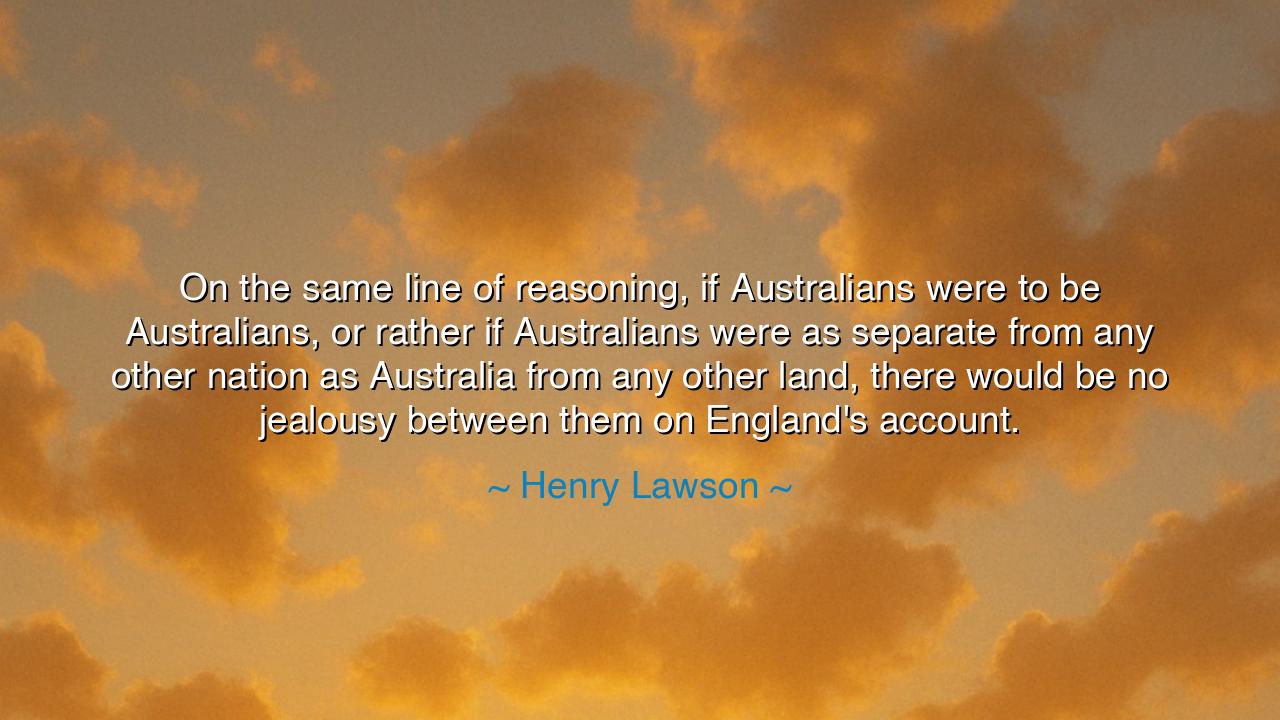
On the same line of reasoning, if Australians were to be
On the same line of reasoning, if Australians were to be Australians, or rather if Australians were as separate from any other nation as Australia from any other land, there would be no jealousy between them on England's account.






There is a fierce and contemplative pride in the words of Henry Lawson, when he wrote: “On the same line of reasoning, if Australians were to be Australians, or rather if Australians were as separate from any other nation as Australia from any other land, there would be no jealousy between them on England’s account.” In these words lies the soul of a nation in its making — a call for identity, unity, and freedom from inherited rivalry. Lawson, the poet of the bush, spoke not merely to his time, but to all generations struggling to define themselves apart from the shadow of empire. He sought to remind his countrymen that the truest strength of a people lies in their self-recognition, their ability to stand as one — unshaken by jealousy, unclouded by imitation, and unburdened by the weight of another nation’s pride.
To understand his meaning, we must remember that Henry Lawson lived in a time when Australia was young — a federation newly formed, yet still bound by sentiment and loyalty to England, the “Mother Country.” Many Australians of his era carried divided hearts: proud of their homeland, yet deferential to the old empire; independent in geography, yet dependent in thought. Lawson, who wandered the harsh yet beautiful bushlands, saw in the land itself a lesson — that Australia was set apart by nature, surrounded by vast oceans, distant from all others. If the land was so separate, he reasoned, why should not the spirit of its people be the same? His words became a plea for national consciousness, for Australians to cease measuring themselves against England, and instead to find worth within their own soil.
When he speaks of “jealousy,” Lawson does not mean petty envy, but the deep unease of a people uncertain of their place. The colonial mind, he saw, often oscillates between admiration and resentment — proud of the parent nation, yet secretly yearning to surpass it. This tension breeds rivalry disguised as reverence, and dependence disguised as love. Lawson knew that as long as Australians looked to England for approval, they would remain spiritually divided. He longed for a generation that would look inward — to the land, the sky, and the labor of their own people — and say, “This is enough. This is ours.”
The wisdom of his words reaches beyond his time, for every nation and every person must one day face this trial: to separate admiration from imitation, respect from servitude. History is filled with examples of peoples who rose to greatness only when they embraced their own identity. Consider India, long under British rule, whose poets and reformers — from Tagore to Gandhi — urged their countrymen to rediscover the strength of their own traditions, their own language, their own dignity. Only then could they cast off the jealousy and inferiority bred by foreign domination. In this same spirit, Lawson’s words echo the timeless truth — that freedom of the body means little without freedom of the mind.
Lawson’s reasoning was not born of rebellion alone, but of love — love for the Australian spirit he saw in the miners, the farmers, the wanderers of the outback. He admired their resilience, their humor, their camaraderie in hardship. He believed that these qualities were not the borrowed virtues of Europe, but the natural fruit of life under the southern sun. Yet he also feared that colonial pride in England’s heritage would dim the brightness of that native flame. “If Australians were to be Australians,” he wrote, then the divisions of envy and imitation would vanish, replaced by unity and self-respect. His words are both a challenge and a blessing — to cherish one’s origins without becoming captive to them.
In his call, we hear the deeper lesson of human growth itself. Just as nations must mature beyond dependence, so must individuals. Each soul must learn to stand alone — grateful for the guidance of mentors and ancestors, but not enslaved to their shadows. The man or woman who constantly measures themselves by others will forever feel jealousy and insecurity. But the one who looks inward, who cultivates their own gifts and walks their own path, discovers a peace no comparison can steal. Lawson’s teaching is therefore not only for Australians, but for all who wish to live nobly: that to be free is to know oneself, and to know oneself is to love without envy.
Let this, then, be the enduring lesson drawn from Henry Lawson’s words: jealousy fades where identity is whole. A people — or a person — who knows who they are need not compete for worth. Nations that honor their own spirit can respect others without resentment, and individuals who trust their own journey can celebrate another’s success without pain. The oceans that encircle Australia, Lawson reminds us, are not barriers, but mirrors — reflecting the truth that separation, when understood rightly, is not isolation but individuality.
Thus, his quote stands not only as a statement of national pride, but as a hymn to self-realization. It urges every generation to rise above borrowed pride, to silence envy with authenticity, and to build their lives — as Australia was built — upon their own foundation. For when a people truly become themselves, jealousy dissolves like mist before the morning sun, and the heart stands proud, unbound, and at peace with the world.






AAdministratorAdministrator
Welcome, honored guests. Please leave a comment, we will respond soon